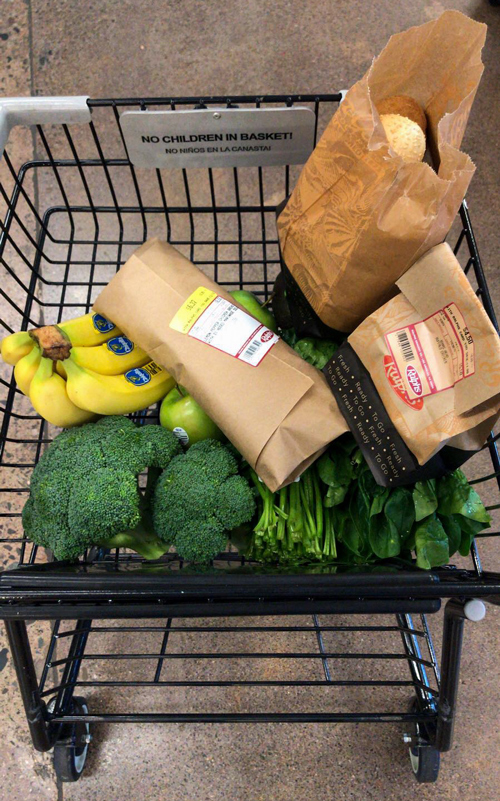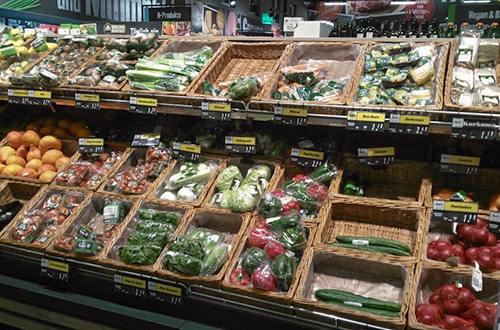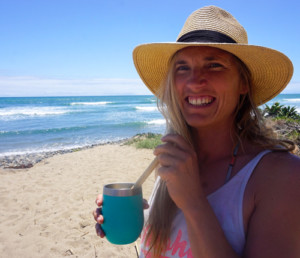International #aweekwithoutplastic Challenge
Inspired by StrawFree.org’s week without plastic, I invited a group of friends from around the world to take the challenge to see what it’s like in different countries to go without plastic.
Plastic is everywhere, all around us and it seems almost impossible to avoid it. Unfortunately, it has become so much that our planet is about to drown in this plastic mess. If we don’t start doing something right NOW, educate ourselves and others, our oceans will die, the land will be poisoned, and sooner than later we will go down with it….
You may think that I am exaggerating and this is just some hipster or eco-movement idea? Well, please take a few minutes to see yourself.
Here are some facts to get a better understanding of the current problem:
-

Could you go a week without plastic? This shopping cart shows ways you can reduce plastic waste during your next trip to the grocery store.
A garbage truck full of plastic waste enters our oceans every minute.
- Over half of the 500 billion plastic bottles manufactured each year are thrown away after a single use, ending up on beaches, in landfill and in the oceans.
- We are told to recycle our way out of this mess. Yet globally, over 90% of plastic isn’t recycled.
- Thousands of seabirds, sea turtles, seals, fishes and other marine mammals are killed each year after ingesting plastic and getting tangled in it.
- People who regularly eat seafood ingest up to 11,000 tiny pieces of plastic each year.
- Big companies are making a huge profit from pushing the cost and burden of single-use plastic onto consumers, low-wage workers, and the environment.
- By the year 2050, there will be more plastic in the ocean than fish.
- Plastic pollution is now recognized as a hazard to public health and the human body. It increases risk of chromosomal and reproductive system abnormalities, impaired brain and neurological functions, cancer, cardiovascular system damage, adult-onset diabetes, obesity and resistance to chemotherapy.
- The drilling of oil and processing it into plastic releases harmful greenhouse gasses into the environment.
Shocked by these facts, we really think there are NO more excuses to wait for our governments or anyone else to solve this problem on our behalf. We must take responsibility for our consumption and materialistic lifestyle. Consequently, we should create awareness in how crucial an intact ecosystem really is to guarantee a sustainable future for our children and generations to come.
I am still really stoked about how seriously my friends from US, Germany, Spain, Sweden and Australia took this challenge and the enormous commitment they showed with their personal battle against the plastic epidemic. In this article, I want to share a little bit about our personal experience with the #AWEEKWITHOUTPLASTIC challenge, how difficult it really was for us, and what we learned from it.
It was definitely shocking for all of us having to realize how much plastic we use every single day. Not even counting electronics, furniture, toys….and so on. We are just talking about the things we buy on a daily basis.
What does the #AWEEKWITHOUTPLASTIC Challenge mean exactly?

#aweekwithoutplastic showed an international group just how much needless plastic is showing up in our shopping carts.
#AWEEKWITHOUTPLASTIC is a movement started by Duncan White from the UK. Strawfree.org took the challenge in 2017 and shared it on social media. I was inspired to share this challenge with a Facebook group I started,“Be part of the solution Not the pollution,” which is a group to create awareness about our plastic problem and share solutions.
#AWEEKWITHOUTPLASTIC is a challenge you can do on your own or, even better, inspire your friends and family to do it in a group. You don’t have to throw out all the plastic you already have. It just means that you try to reduce or eliminate your plastic consumption when you go grocery shopping for one week. Like any kind of detox or diet, the more seriously you take the challenge the more you will get out of it. You are going to be way more aware about the products you buy and you will have to find certain kind of special food stores where you can find more plastic free products. You will learn which products you can eliminate and which once you can’t or just don’t want to. Ultimately mother nature will thank you for each little piece of plastic you are going to eliminate from your daily life.
The products which were most difficult to find not wrapped in plastic and difficult to avoid for us have been:
United States- Bread, water, wild berries, vegan food like Tofu, toiletries, toilet paper, deodorant, cleaning products.
Spain – water, face creams, medicine, toilet paper.
Germany – organic food, butter, toilet paper, cleaning products.
Sweden – organic foods.
Australia – oats, grains like quinoa, sliced bread.
This list includes our own personal items which seemed most difficult for us to get. However, I am sure there are many more products we could add after a longer time trying to live without plastic.
The most profound issues concerning the plastic epidemic:
United States
- Over packaging, especially when ordering online.
- America is very consumption and profit orientated, which leads to more over packaging.
- Government is protecting the big corporations instead of us and the environment.
- The average American doesn’t care or is just not aware of the negative impact which plastic has on the environment.
- America is driven by a ‘to go’ culture which basically invented the single use plastics for our daily use and convenience.
- There is very little education about how to treat the environment with less negative impact.
Spain
- Plastic bottles are everywhere, even in restaurants you will get served a plastic bottle if you order water.
- Most people’s mindset is very ignorant about the issue and there is also not much education about the plastic waste problem.
Germany
- For high ‘safety’ regulations there are even more fruits and vegetables, especially organic food, wrapped in plastic.
- The better recycling system in Germany gives people the idea that plastic waste isn’t a problem anymore, which unfortunately isn’t the case.
- Everything you buy new is always wrapped in plastic.
Sweden
- In Sweden, it seems to be very difficult to get organic vegetables and fruits that aren’t wrapped in plastic.
- You will pretty much find the same problems as in any other European country.
Australia
- There isn’t an environmentally friendly solution of disposing plastic yet.
- Supermarkets are still phasing out plastic bags.
What we learned from this challenge:
- It is possible to significantly reduce plastic waste if you are more aware of the products you buy and how it is packaged. In many cases you can find some better alternatives.
- Unfortunately, even some environmentally friendlier products will have plastic packaging.
- Products are mostly wrapped up for more convenience, leading to one-time use plastics.
- Most companies care more about maximizing profit instead of the environment.
- We realized we weren’t alone in this fight against plastic pollution, there are in fact many organizations and groups of people trying to fight it too.
- There are plastic-free alternatives available for many of the products, but it takes up a lot more time to get these items for our daily needs, what makes it almost impossible to live a complete plastic-free lifestyle.
- It is very hard to avoid plastics completely but, step by step you can change to a more environmental friendlier lifestyle, and everything less is one step more to a cleaner planet.
- It is indeed important to speak up, and let people know why you are on a plastic-free mission. Otherwise people just won’t understand and keep going with their habits. Just don’t give up trying!
- At first it feels almost embarrassing to ask for no plastic items, but in the end, we became more confident and actually realized that it is a pretty cool thing to do and there should be more pride instead of embarrassment to do the right thing. So lets say it out loud…NO STRAW PLEASE!!! NOOO PLASTIC PLEEEEAAAASE!!!
- Once you are aware of the amount of plastic use it feels ridiculous and insane how the people around you are just not aware of their crazy plastic consumption. Doing this experiment it definitely changed our perspective. And, hey, what does this mean? Yes right! If we can do it, you can do it even better!!! 😉
Our new gained habits and what YOU can implement in your life step by step as slowly or fast you want:
- Take a reusable bottle to the restaurant and for your coffee.
- Use reusable shopping bags also for putting fruits and vegetables in.
- Cook more, eat more fresh food which leads to a healthier lifestyle. Can’t be that bad, right?!;-)
- Use shampoo soap bars instead of the bottled shampoos. (e.g. lush cosmetics; lushusa.com, Etsy.com) I really fell in love with those honestly. I saved so much space in my bathroom, they work way better than I could have even imagined, and they are much healthier to my skin than conventional shampoo.
- Buy more second hand, like clothes, furniture, toys….
- Buy a water filter or get fresh water delivered in a glass container. I personally found my solution through Whole Foods in America. They have a water filter machine and you can fill with your own containers or buy them there, in case you don’t want to spend lots of money in filters or other water delivery systems. (www.freshpure.com)
- Wrap your food in organic reusable food wraps instead of the plastic foil. (e.g. Bee’s Wrap)
- Buy in bulk, take your own container, or reusable bags.
- Say NO to Straws or use a reusable one.
- Shop at package free shops if there are some in your city. There are also online shops available.
- Buy bread at your local bakery (Whole Foods e.g. has a wide range of fresh bread, my personal favorite place for bread I discovered is Boudin Sourdough/SF. Available in Northern and Southern California. In case you are as picky with bread as I am 😉)
- Buy your meat and cheese at the counter in your supermarket, ask for paper instead of plastic or bring a container.
- Go back in time and use a stainless safety razor. They are awesome and cheaper long term. 😉 (e.g. Safety razor Merkur 33C)
- Only for women: start using a menstrual cup or cloth sanitary pads
- Brush your teeth with bamboo toothbrushes and maybe make your own toothpaste. Why not? 😉
- Buy biodegradable poop bags for dogs.
- Inspire your friends and family!!!!
Helpful Links:
- 10 easy ways to reduce waste TODAY
- Life Without Plastic online store
- Package Free Shop Online
- Recipe for dishwasher powder
- USA Spring Water delivery
- Plastic-free Soaps/Shampoos US Or www.Etsy.com — both available in Europe too
- Make your own nontoxic, plastic-free cleaner
- Cotton bags for your vegetables, fruits and bulk shopping
- Make your own soaps and beauty products
Resources to Educate Yourself and Your Loved Ones
- 10 Reasons Why You Feel So Good In Nature – This is a good read if you want to know why protecting our amazing natural environment is so important for us.
- Watch “A Plastic Ocean” — it is available on Netflix.
Guest Post by Jessica Kuehnel
 Jessica Kuehnel is the moderator for the Facebook group ‘Be part of the solution not the pollution!” She is originally from Germany and currently resides in Orange County where she is passionate about surfing and healthy living.
Jessica Kuehnel is the moderator for the Facebook group ‘Be part of the solution not the pollution!” She is originally from Germany and currently resides in Orange County where she is passionate about surfing and healthy living.
